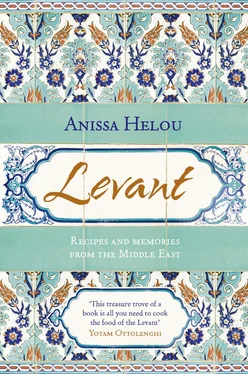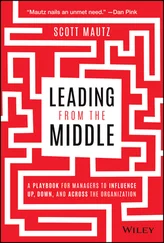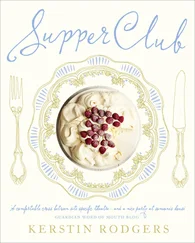Tasting the food in situ and seeing the ingredients in the markets – the vibrant spices and mounds of fresh produce – will make you appreciate the different cuisines of the Levant even more. All of which brings me to say a few words about the ingredients needed for the recipes. We are all aware now about the difference the quality of ingredients makes to a dish, especially if it is one that you haven’t made before. Many of the essential ingredients that I call for in the recipes will last in your kitchen cupboard and I would urge you to source them carefully to achieve the best results.
I would also recommend you follow the recipe carefully too. I still remember, when tabbuleh became fashionable, how many recipes advocated soaking the burghul. I couldn’t understand why cookbook writers would advise such a step as we normally rinse and drain the burghul and use it straight away. Later, I developed my own method of letting the burghul sit after rinsing and draining so that it fluffs up and absorbs just the right amount of dressing. Then I realised that the soaking instructions were because the writers were using coarse-grade burghul which we reserve for cooking only, using the fine-grade variety that doesn’t need any soaking for salads and kibbeh . In fact, soaking fine-grade burghul makes it mushy. This is only one example but it illustrates the importance of sourcing the ingredients properly. So, go to a specialist store, buy the best you can afford, having read the recipe carefully, and you will be rewarded with superior results that will impress your family and friends.
And finally a word about the transliteration and spelling of foreign terms. There are many different ways of transliterating Arabic and, browsing online or looking through other books, you will see different spellings for the same word or recipe name. I have relied both on a classic form of transliteration and a phonetic one to transcribe words as I would say them in Arabic, whereas I have used only the classic transliteration for Iranian. The Turkish alphabet has been used for words in Turkish.
Anissa Helou
London, February 2013
Конец ознакомительного фрагмента.
Текст предоставлен ООО «ЛитРес».
Прочитайте эту книгу целиком, купив полную легальную версию на ЛитРес.
Безопасно оплатить книгу можно банковской картой Visa, MasterCard, Maestro, со счета мобильного телефона, с платежного терминала, в салоне МТС или Связной, через PayPal, WebMoney, Яндекс.Деньги, QIWI Кошелек, бонусными картами или другим удобным Вам способом.












